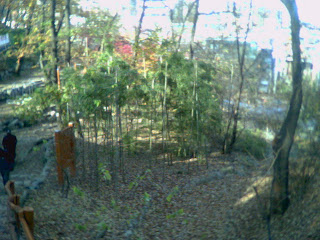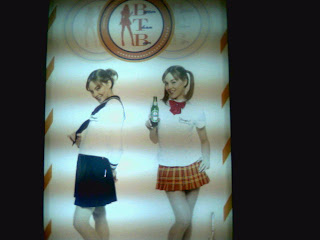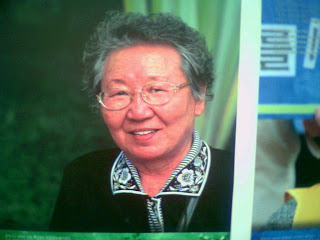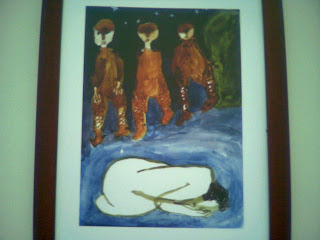Huge floppy leaves streamed into a dark little side street. No picture, but it was sure beautiful. Fall is waning, and the multicoloured leaves are falling fast, to make room for winter's starkness.
(PS: A bald tree in front of a streetlight is a really beautiful thing -- the way the thinnest twigs catch the light in a halo makes me think of spiderwebs.)
Next morning, street looked like this:

Unfortunately, some of those leaf piles concealed restaurants' compost bags, so it was a bit risky to stomp through them, and this pile (and many others) were big enough to conceal a sleeping hobo (who prefer to be left alone, rather than kicked by big kids like me), so I was a little cautious dragging my feet through them and letting the leafy crunchy sound fill my head up with happy-sauce and happy-sense.
I love the vein pattern of these kinds of leaves.

Today is Sunday. I walked with Matt for a good two hours this afternoon, on a riverside, a hill, and a university campus, talking (which was nice) but basically just being out in the middle of fall, letting the wind blow around us, and being alive. Fall in Korea is heaven, I swear. Even in the city, and even more in the country.
Trees are so beautiful. In the words of Annie Dillard: "You are God. You want to make a forest, something to hold the soil, lock up solar energy, and give off oxygen. Wouldn't it be simpler just to rough in a slab of chemicals, a green acre of goo?" Sure glad God decided to go for the glamour and make something really, really, ridiculously good-looking instead. My friend Anna once used the word gratuitous, as in "We have a gratuitous god" and I'd have to say the beauty set into the world around us is absolutely gratuitous -- totally unnecessary! Beauty for beauty's sake alone! Almost shocking to my sensibilities, if I actually think about it, and definitely an apalling degree of overkill -- one tree ought to be enough beauty for any city in its entirety, yet instead, we're just overwhelmed by them, so much that we don't even think twice about cutting down these miracles of beauty and function!
Trees and colours against the sky: here's late fall in Seoul (today was the first properly cold day in Seoul -- gloves instead of pockets, heavy coats instead of layers).

Yet somehow the bamboo trees kept ALL their green.

Next: a path. With colours. I wish you could have been there. The green and red on the path is recycled car tires or something -- it makes the surface very pleasant and springy for walking or jogging.

Certain trees' leaves curl up like a hand when the cold gets to them. It's a bit hard to see this one, but imagine an entire tree where instead of falling, the leaves have curled up into fists -- not unlike some people who curl themselves up in the cold (instead of just going inside). Almost like Christmas tree ornaments.

This was a little tree grove in Kyunghee university: every leaf colour imaginable was somewhere in the grove, layered above and below the other colours. The leaves hadn't been swept up or rained upon, so they gave a really nice crunch underfoot. Matt and I lay down on our backs and stared up at the layers of leaf-colours and bare branches.

Like this. There were a few hundred birds in the grove, pipping and singing away, and the people walking by gave the ground a rustle. The sun was just low enough in the sky to come in from the side, and it was as if the sunlight plugged the colours in, threw a switch and set them blazing.

This (below) was the view from on our backs, looking up at the leaves. The sun and the leaves and the breeze and the birds joined together in an act either of love or of worship (or maybe both, if that's not too blasphemous or superlative for you). It was cold enough to see our breath, and every direction had a different mix of colours. The picture is two dimensional so it's hard to see how the leaves were layered one above the other, but I tell you, the rocks and trees were singing today.

After five or ten minutes (or maybe it was thirty seconds, or maybe it was five days -- it doesn't matter) Matt stood up and said to me, "Congratulations. You have taken part in a perfect moment in time." And he couldn't have been more right if a voice from the sky had spoken along with him, and then a mysterious hand had materialized and given him a high-five.
I can't find the exact quote, but I came across a spot where Steven Hawking said something to the effect that, of all the possible universes that could have existed, isn't it interesting that the one we live in, the one that DID come about, was one that contained creatures who could contemplate it, and wonder at it. Whether this leads us to proof of some creator or not, the fact remains, the universe constantly screams out "HERE I AM! BE AMAZED!", and we, humans, are lucky enough to have the capacity to do exactly that, and from there, even to search for a meaning to it all. Thank God! Framed in religious terms, the entire world was worshipping God today, and calling all the people in Seoul to worship with it. It was absolutely transcendental, and yet also absolutely embodied, rooted in the Here and Now of creation, and I don't know if there needs to be any more meaning to an autumn day than "Autumn is beautiful" and "Here I am! Be amazed!".
Here it is. Be amazed.


The earth is visible in this picture of Saturn.





And look at this one again, too. Just soak it in. It's as beautiful as a liturgy. . . I don't know if the picture is, but the moment sure was.
A chapel is a beautiful place to worship, sometimes (I'm thinking of those cathedrals that create a space of holiness by their mere design). . . but when God builds a place of worship, it's never exactly the same for two days in a row, and that says something.

Sometimes I think that's enough meaning for life -- just that it's so darn full of beauty. Some stories have no real meaning except "here's a great story" and some autumn days are the same, and seeing that, and accepting and enjoying it for exactly what it is: breathtaking beauty -- is an act of worship to whichever deity one chooses to credit. I'm glad I'm alive! Thanks, God, for giving me senses!
Other stuff:
The trivial:
how many song references can you spot/recognize in this chart?
 It's Autumn in Korea. . . hang in there and I'll tell you about it. If you remember Josh Barkey from university, here's his blog, and a post that I really enjoyed -- a cool perspective on sin, if you will.
It's Autumn in Korea. . . hang in there and I'll tell you about it. If you remember Josh Barkey from university, here's his blog, and a post that I really enjoyed -- a cool perspective on sin, if you will.Some pictures, just to increase the tease.
In a city as crowded as Seoul, sometimes parking solutions get creative.

From a hostess bar: white fetish, schoolgirl fetish, the name of the bar (if you can't see it) is "better than beer". Matt and I decided there were probably no white girls OR school uniforms on the premises. . . and it wouldn't take much for it to be better than beer anyway, given the quality of Korea's local brews. Won't find me in there checking, though.

A little konglish





































